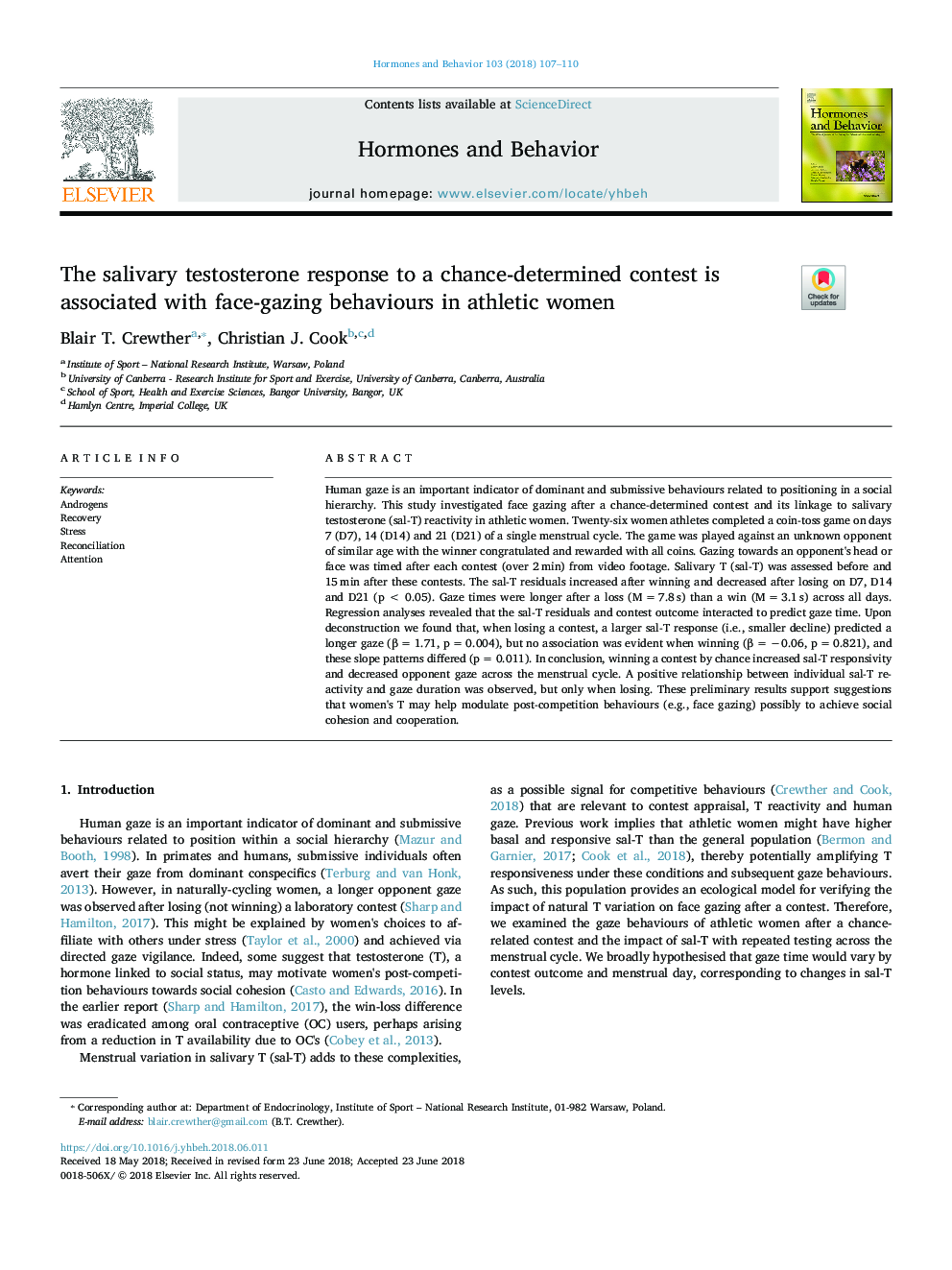| کد مقاله | کد نشریه | سال انتشار | مقاله انگلیسی | نسخه تمام متن |
|---|---|---|---|---|
| 6793701 | 1432737 | 2018 | 4 صفحه PDF | دانلود رایگان |
عنوان انگلیسی مقاله ISI
The salivary testosterone response to a chance-determined contest is associated with face-gazing behaviours in athletic women
ترجمه فارسی عنوان
پاسخ تستوسترون بزاق به یک مسابقه مشخص شده با شانس همراه است با رفتارهای فکری در زنان ورزشی
دانلود مقاله + سفارش ترجمه
دانلود مقاله ISI انگلیسی
رایگان برای ایرانیان
کلمات کلیدی
آندروژن ها، بهبود، فشار، اصلاح، توجه
موضوعات مرتبط
علوم زیستی و بیوفناوری
بیوشیمی، ژنتیک و زیست شناسی مولکولی
علوم غدد
چکیده انگلیسی
Human gaze is an important indicator of dominant and submissive behaviours related to positioning in a social hierarchy. This study investigated face gazing after a chance-determined contest and its linkage to salivary testosterone (sal-T) reactivity in athletic women. Twenty-six women athletes completed a coin-toss game on days 7 (D7), 14 (D14) and 21 (D21) of a single menstrual cycle. The game was played against an unknown opponent of similar age with the winner congratulated and rewarded with all coins. Gazing towards an opponent's head or face was timed after each contest (over 2â¯min) from video footage. Salivary T (sal-T) was assessed before and 15â¯min after these contests. The sal-T residuals increased after winning and decreased after losing on D7, D14 and D21 (pâ¯<â¯0.05). Gaze times were longer after a loss (Mâ¯=â¯7.8â¯s) than a win (Mâ¯=â¯3.1â¯s) across all days. Regression analyses revealed that the sal-T residuals and contest outcome interacted to predict gaze time. Upon deconstruction we found that, when losing a contest, a larger sal-T response (i.e., smaller decline) predicted a longer gaze (βâ¯=â¯1.71, pâ¯=â¯0.004), but no association was evident when winning (βâ¯=â¯â0.06, pâ¯=â¯0.821), and these slope patterns differed (pâ¯=â¯0.011). In conclusion, winning a contest by chance increased sal-T responsivity and decreased opponent gaze across the menstrual cycle. A positive relationship between individual sal-T reactivity and gaze duration was observed, but only when losing. These preliminary results support suggestions that women's T may help modulate post-competition behaviours (e.g., face gazing) possibly to achieve social cohesion and cooperation.
ناشر
Database: Elsevier - ScienceDirect (ساینس دایرکت)
Journal: Hormones and Behavior - Volume 103, July 2018, Pages 107-110
Journal: Hormones and Behavior - Volume 103, July 2018, Pages 107-110
نویسندگان
Blair T. Crewther, Christian J. Cook,
